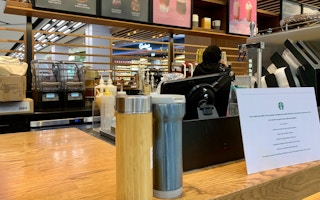Reuseable containers such as carrier bags, lunchboxes and water bottles do not pose a viral contagion risk if basic hygiene rules are followed, more than 100 health experts and scientists have said.
To continue reading, subscribe to Eco‑Business.
There's something for everyone. We offer a range of subscription plans.
- Access our stories and receive our Insights Weekly newsletter with the free EB Member plan.
- Unlock unlimited access to our content and archive with EB Circle.
- Publish your content with EB Premium.
Their statement, released on Monday, sought to reassure consumers and retailers that bring-your-own (BYO) container schemes are not a public health threat, and can still be used as an alternative to disposables.
The Covid-19 pandemic has led to a resurgence in single-use plastic waste as countries rescinded plastic bans and retailers scrapped BYO schemes. Lockdowns and heightened hygiene measures have led to a sharp increase in food delivery trash and disposable personal protective equipment use.
Environmental groups including Greenpeace have said the plastics industry has exploited the crisis by lobbying against bans on single-use plastic, claiming that disposable plastic products help stop the spread of the virus.
The statement, signed by 115 scientists from 18 countries including Taiwan, the Philippines and Malaysia, said reusable systems can be used safely by employing basic hygiene such as ware-washing at high temperatures and using contact-free systems for customers’ containers.
It pointed to research that shows that the virus is transmitted mainly through droplets in the air, rather than through contact on surfaces, and that reuseable objects present the same potential for viral spreading as disposable materials. “Single-use plastic is not inherently safer than reusables, and causes additional public health concerns once it is discarded,” the health experts said.
Mixed messages
Retailers have taken a confused approach to Covid-19 prevention in recent months. In a shopping mall in Singapore visited by Eco-Business on Tuesday, two US-headquartered coffee chain outlets located within 20 metres of each other, Starbucks and The Coffee Bean & Tea Leaf, have completely different BYO policies; the former does not accept reuseable cups, the latter does.
At SaladStop!, a healthy eating chain with outlets in Japan, Indonesia, Hong Kong, Korea, Malaysia, Vietnam, Singapore and the Philippines, BYO is available to customers only in the latter three markets.
Co-founder Katherine Desbaillets said that there have been “no concerns” about Covid-19 transmission in these markets as customers’ reuseable containers are not allowed to touch other items on the food preparation bar, and a designated area for BYO bowls is disinfected after every BYO order.
Desbaillets said that there have been no complaints about any perceived contagion risk from BYO because “customers are aware of how the process works and how we keep BYO items separate.”
There have been no reported cases of reuseable containers causing the spread of the virus, or outbreak hotspots at retail outlets that offer BYO.
Greenpeace campaigner Marian Ledesma said that as governments allow businesses to reopen, “reusable systems and single-use plastic bans must be implemented to ensure the protection of the environment, workers, and consumers”.














